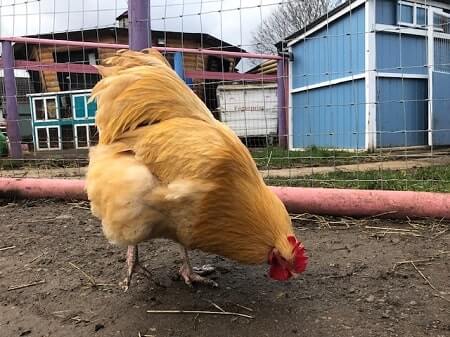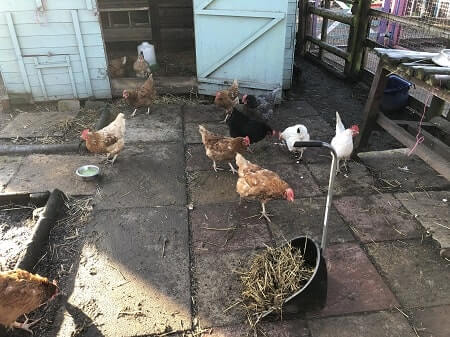There are loads of benefits to letting your backyard chickens go free-range. You’re right to be anxious about letting them roam the first time, but it’ll be fine as I’ll explain.
How long to keep chickens in coop before free range? If you’ve recently rehomed or adopted some chickens, you should keep them locked up in their coop for at least one week before letting them go free-range.
For the first week of letting them out, you should also test them with a couple of hours a day before dark.
Chickens will come home to roost naturally when it starts getting dark. The two weeks locked up inside their coop will condition them to return to their coop for food, water, and sleeping.
Table of Contents
Benefits of Letting Your Chickens Free Range
I’m a huge advocate for letting chickens roam free over being cooped up all day or confined to their run.
Here are some of the benefits of letting your backyard flock go free range:
They'll Help Control the Bug Population
Having creepy crawlies, bugs, and insects in the yard is unavoidable. There’s no harm in reducing their numbers though, and chickens are awesome for that.
They will eat ants, snails, worms, grubs, and all kinds of insects. It’s good for their health and something chickens would do naturally in the wild.
They'll Have a More Varied Diet

Commercial feed is great for chickens and it's been specially formulated to meet their dietary requirements. It does them some good to get some variety in their diet though.
I’ve covered various table scraps, vegetables, fruits, and so on you can give chicks. But you can’t beat just letting them forage and scratch around for themselves.
Just be aware of any toxic or dangerous plants and insects that may be in your yard. Take a look at what’s growing wild. If in doubt, do some research online to make sure they aren’t going to gobble up something toxic.
Related content - Be careful letting your chickens eat wild mushrooms.
Their Eggs Will Taste Better
It’s no secret that free-range chicken’s eggs taste better than regular supermarket eggs. Unless you’re buying eggs that state they’re free-range chickens, of course.
If not, you’re likely buying eggs that were laid by caged hens. Caged or “battery” hens.
Caged hens are kept in stressful, cramped conditions and are fed a bland basic diet. The goal of the business is to produce as many eggs for the lowest cost possible.
This has an impact on the quality and taste of the eggs. Most people aren’t even aware of how different caged and free-range egg taste, but take it from me there is a huge difference.
If you’re eating eggs from your flock and they’ve been roaming free-range, you won’t turn back after tasting those delicious free-range eggs, trust me.
They'll Be Happier
This is what we really want for our beloved backyard flock, right? We want our chickens to be happy, and happy chickens are healthy chickens. It’s a win-win.
Seeing chickens have the space to roam around and interact with each other is a rewarding and fun experience.
Until they destroy a flower bed or poop all over the garden path that is. ...
How Do You Keep Free Range Chickens From Running Away?

This might sound like a leap of faith, but it’s also backed up with years of experience and dozens of testaments from other backyard chicken owners:
If your chickens have been kept inside your coop for at least a week as discussed above, they will not run away.
At least, there is a very slim possibility of chickens running away.
I’ve never had a chicken run away. I’ve never heard any other owners say they’ve had chickens run away either.
Chickens instinctively stay near to their homes (coops). They tend to roam up to 300 yards or so away, despite how much space they have to roam in.
Will Chickens Go Back to the Coop at Night?
This is one of the main concerns when backyard flock owners let their chickens out to roam for the first time. I know it was for me.
The last thing you want is to have to go searching for your chickens when it’s getting dark. They are hard to round up too when they don’t want to be.
The thing about chickens, however, is that they come back on their own at night.
And who can blame them? A nice safe coop with a roosting bar to sleep on, nesting boxes, and food and water inside, sounds like a good idea to me.
At worst, you might have to shake some food or call them to bring them in. But I’ve never had a problem getting my flock in at night, and I’ve not heard about it being a problem for other owners either.
In Summary - How Long to Keep Chickens in Coop Before Free Range?
Having free-range chickens come back to their coop at night isn’t a big deal and shouldn’t be a problem for you.
It’s recommended you keep your chickens in their coop for a week or so to “condition” them. Then they can be let free to roam outside of their run without worrying that they’ll run away.
Chickens almost always stay within close proximity to their coop. They will return throughout the day to eat and drink, as well as returning at night to roost.
The only concern most backyard chickens owners have is protecting their flock from predators.
This is something you need to be very aware of in the area where you live. Chickens are much more likely to be “stolen” than they are to stray too far from their coop or not return of their own accord.
Related content - Tips to protect your chickens from owls.




